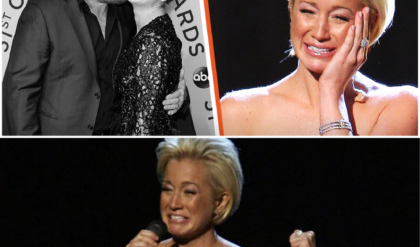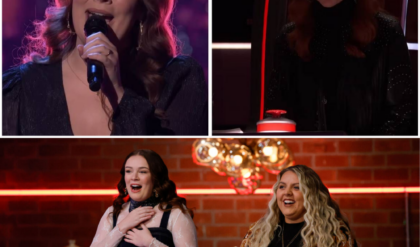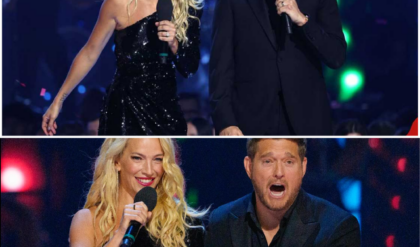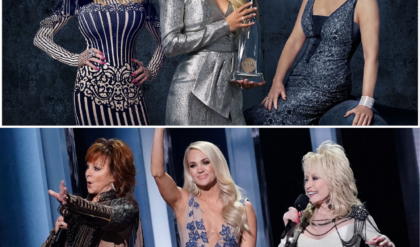In the swirling mists of Scotland’s ancient standing stones, where the veil between eras frays like a tartan threadbare from war’s relentless tug, Outlander: Blood of My Blood emerges as a prequel that doesn’t merely echo the whispers of its progenitor but roars with the ferocity of untamed legacy. This Starz spinoff, helmed by showrunner Matthew B. Roberts and executive produced by Ronald D. Moore, unfurls across dual timelines— the blood-soaked heather of 18th-century Highlands and the shell-shocked trenches of World War I England— to illuminate the origins of two of television’s most indelible souls: Jamie Fraser and Claire Beauchamp. Premiering on August 8, 2025, with a bingeable two-episode drop followed by weekly Friday installments, the 10-episode first season captivated 8.2 million global viewers in its opening week, blending the original Outlander‘s lush romance with swashbuckling peril and a darker undercurrent of familial fracture. Renewed for a second season in June 2025— before a single frame aired— the series signals Starz’s unyielding faith in a universe that now spans generations, proving that in the Fraser and Beauchamp bloodlines, love is not a balm but a blade.
The narrative duality is its genius: parallel love stories that mirror yet subvert the central saga of Claire and Jamie, forging connections across centuries that feel predestined yet perilously fragile. In the 1700s, we witness the tempestuous courtship of Ellen MacKenzie (Harriet Slater) and Brian Fraser (Jamie Roy), whose union births the fiery laird whose shadow looms large over Outlander. Ellen, the willful daughter of Castle Leoch’s scheming laird Jacob MacKenzie, chafes against her clan’s matrimonial machinations, her spirit as untamable as the Highland gales. Brian, a steadfast Fraser kinsman with a poet’s heart and a warrior’s resolve, becomes her forbidden beacon amid Jacob’s plots to wed her to the brutish Malcolm Grant for political gain. Their romance ignites amid the Gathering’s raucous revels—fiddles wailing, whisky flowing, kilts swirling in torchlit dances— but quickly curdles into a saga of exile, ambush, and clandestine vows whispered in fog-shrouded bothies. Ellen’s flight from her forced betrothal, aided by Brian’s loyal godfather Murtagh Fitzgibbons Fraser, spirals into a clan war that tests loyalties forged in blood oaths, revealing the MacKenzies’ rot at its core.
Interwoven is the tale of Claire’s parents, Julia Moriston (Hermione Corfield) and Henry Beauchamp (Jeremy Irvine), a nurse and soldier whose epistolary idyll amid the Great War’s carnage blossoms into a passion that defies mustard gas and mustard seeds of doubt. Julia, a sharp-tongued censor in London’s war offices, sifts through soldiers’ letters like a surgeon excising despair, her own heart kindled by Henry’s dispatches from the front—missives sealed with a kiss that speak of dreams beyond the barbed wire. Their wartime wedding, a hasty affair in a bombed-out chapel, yields a fragile peace shattered by the armistice’s hollow cheers. Yet, in a narrative sleight-of-hand that recontextualizes Claire’s canonical orphanhood, Julia and Henry are hurled through the stones not in death but in desperation: a Highland holiday crash propels them backward to 1714, separating them across enemy lines—Julia ensnared in Fraser service, Henry indentured to the rival Grants— their infant son William a pawn in the chaos.
Director Jamie Payne, a Outlander veteran, lenses the series with a painterly eye: the verdant fury of Scottish glens, where emerald hills bleed into bruised skies, contrasts the sepia-drenched desolation of WWI foxholes, where mud churns like primordial soup. Production designer Jon Gary Steele resurrects familiar haunts—Doune Castle as the labyrinthine Leoch, Wardpark Studios’ backlots as the Western Front— while cinematographer David Franco employs a desaturated palette for the 20th century’s grit, blooming into vibrant tartans for the 18th’s pageantry. Composer Bear McCreary’s score weaves bagpipe laments with dissonant strings, evoking the thrum of distant thunder that heralds time’s inexorable storm.
Thematically, Blood of My Blood grapples with inheritance’s double edge: how the sins of sires cascade through veins, turning paternal protection into perilous legacy. Ellen’s defiance of Jacob’s tyranny foreshadows Claire’s own rebellions, while Brian’s quiet honor prefigures Jamie’s unyielding code. Julia and Henry’s displacement—echoing Claire’s 1743 uprooting— probes the cost of temporal trespass, their letters evolving from love notes to coded pleas across clan divides. The season’s slow-burn tension culminates in a finale penned by Diana Gabaldon herself, where Ellen and Brian’s hard-won reunion in a storm-lashed chapel is undercut by Jacob’s vengeful machinations, and Julia, Henry, and baby William teeter at Craigh na Dun’s humming threshold, pursuers’ torches flickering like hellfire. Gabaldon teases in interviews that season two’s “dramatic and heart-wrenching” opener for Henry will “finish us all,” hinting at rifts that bleed into Outlander‘s lore— perhaps William’s fate intertwining with Jamie’s lost brother, or Julia’s Fraser entanglement birthing unforeseen kinships.
Critics have crowned it a “swoon-worthy triumph,” with a 91% Rotten Tomatoes score praising its “rich vein of romance and adventure” that honors the original without imitation. Filming for season two, underway since June 2025 in Scotland’s sodden wilds, promises escalation: clan wars erupting into Jacobite stirrings, Julia and Henry’s stone-crossed odyssey delving deeper into temporal mechanics, and cameos from Outlander elders teasing crossovers. In a franchise poised for Outlander season 8’s 2026 swan song, Blood of My Blood isn’t filler— it’s foundation, a haunting testament that in this universe, history doesn’t repeat; it demands reckoning, and the price is ever the blood of my blood.
Actors
Outlander: Blood of My Blood assembles a quartet of leads whose alchemy rivals the original series’ magnetic pull, each performance a tapestry thread weaving the prequel’s emotional warp and weft with exquisite precision. Harriet Slater commands as Ellen MacKenzie, the flame-haired firebrand whose portrayal crackles with the untamed vitality that birthed Jamie Fraser’s indomitable spirit. Fresh from Penny Dreadful‘s ethereal Victor Frankenstein, Slater infuses Ellen with a feral grace— her wide, storm-gray eyes flashing defiance during clan councils, her lithe frame coiling like a bowstring in escape sequences through bracken-choked glens. Ellen’s arc, from dutiful daughter to defiant eloper, demands a spectrum of ferocity: Slater’s throaty laugh amid Gathering dances dissolves into tear-streaked resolve at the bothy’s hearth, her chemistry with Jamie Roy a slow-simmering blaze that evokes Heughan’s Jamie in nascent form. Off-set, Slater immersed in Gaelic lore and Highland dance, her commitment yielding a performance that’s “electrifying,” as co-star Roy attests, capturing Ellen’s maternal ferocity long before Lallybroch’s hearth.
Jamie Roy anchors the 18th-century strand as Brian Fraser, the stoic laird-to-be whose quiet thunder prefigures his son’s Highland heart. A Scottish stage stalwart from Sunshine on Leith, Roy embodies Brian with a rugged authenticity— broad-shouldered and bronze-skinned from “muddy moors” rehearsals, his brogue a gravelly melody that rumbles through interrogations and tender trysts alike. Brian’s loyalty to kinsman Murtagh, forged in boyhood brawls, shines in Roy’s subtle physicality: the protective hunch over Ellen in ambushes, the flicker of paternal pride in stolen glances. His reconciliation with Murtagh in the finale— a bear-hug amid torchlit peril— is Roy’s emotional zenith, a raw unspooling that hints at the widower’s quiet grief in Outlander canon. Roy’s on-location bonding— pub crawls with the ensemble, swordplay drills at dawn— bleeds into his portrayal, making Brian not archetype but ancestor, flesh-and-blood progenitor whose “poet’s soul” Roy drew from forgotten Fraser ballads.
Hermione Corfield brings luminous vulnerability to Julia Moriston, the 20th-century nurse whose censor’s quill and healer’s hands bridge Edwardian propriety with temporal anarchy. Known for Mission: Impossible – Dead Reckoning‘s steely operative, Corfield reimagines Julia as a beacon of wry intellect— her pert smiles masking the war-weary hollows beneath, her fingers tracing letter creases like Braille of the heart. Julia’s journey from London letter-sifter to stone-tossed sojourner demands Corfield’s chameleon range: the poised flirtation in wartime trysts yields to guttural sobs at Henry’s presumed loss, her Highland reinvention as Fraser maidservant laced with Claire’s own adaptive cunning. The actress, shadowing WWI nurses for authenticity, nails Julia’s maternal steel in William’s cradle-side vigils, her on-screen reunion with Irvine a tearjerker that “wrecks in the best way,” per fan fervor. Corfield’s off-kilter humor— ad-libbed quips during mud-caked shoots— infuses Julia with levity, ensuring her not as tragic footnote but fierce foremother.
Jeremy Irvine rounds the core as Henry Beauchamp, the shell-shocked surgeon whose aristocratic poise fractures into desperate valor, seeding Claire’s enigmatic lineage. From War Horse‘s wide-eyed innocence, Irvine evolves Henry into a man of shadowed depths— his chiseled jaw set in trench-line stoicism, softening to boyish awe in Julia’s arms. Henry’s indenture to the Grants, a blade-sharp twist, showcases Irvine’s visceral intensity: sweat-slicked duels in heather fields, haunted stares across clan divides, his letters’ eloquence giving way to coded Highland pleas. The finale’s stone-side bargain— Henry’s selfless step into the vortex— is Irvine’s tour de force, a performance of “convoluted heartbreak” that the actor, drawing from family war diaries, renders palpably paternal. His sparring with Corfield crackles with intellectual spark, while bonds with Slater and Roy— forged in Scotland’s relentless rains— yield ensemble warmth that elevates every tartan-clad tableau.
Supporting the quartet is a gallery of Outlander familiars reborn younger: Rory Alexander’s Murtagh, a brooding godfather whose loyalty bleeds like an open vein; Séamus McLean Ross’s Colum, scheming from his twisted spine; Sam Retford’s Dougal, all hot-blooded ambition; Conor MacNeill’s Ned Gowan, the bespectacled bulwark of law. Tony Curran’s Lord Lovat slithers with fox-like cunning, Peter Mullan’s Red Jacob looms patriarchal menace, and cameos like Sara Vickers’ Davina Porter nod to temporal echoes. Filmed amid Wardpark’s weathered sets and Doune’s storied stones, the cast’s immersion— Gaelic lessons, historical reenactments— forges a company as tight-knit as the clans they portray. In Blood of My Blood, these actors don’t inhabit roles; they inherit them, breathing life into forebears whose passions pulse through the stones, ensuring the Outlander flame burns eternal.
Plot Twists
Warning: This section contains major spoilers for Outlander: Blood of My Blood season 1 and teases for season 2. If you’re not caught up, flee to the bothy—these revelations will shatter the stones.
Outlander: Blood of My Blood deploys twists like standing stones themselves: ancient, immovable sentinels that, once circled, upend the landscape, forcing reevaluation of every heather-trod path. Roberts’ scripting, laced with Gabaldon’s canon winks and original flourishes, eschews cheap shocks for seismic shifts that ripple across timelines, binding Julia and Henry’s WWI fragility to Ellen and Brian’s Highland fury. The season’s non-linear weave— letters folding into prophecies, car crashes birthing clan curses— culminates in a finale cliffhanger that spirals fans into theory tempests, with season two’s production promising detonations that “flip everything,” per Irvine.
The premiere’s temporal torpedo strikes without mercy: what Outlander canon etched as Julia and Henry’s fatal 1920s car crash is recast not as endpoint but portal. Their Highland jaunt— a post-war idyll of packed lunches and whispered futures— veers into apocalypse when their auto plunges off a rain-slicked cliff, hurling them through Craigh na Dun’s vortex to 1714. But the gut-wrench? Separation: Julia awakens gem-less (her wedding ring’s stone, the time-travel talisman, ejected in transit) amid Fraser crofters who “rescue” her into servitude at Castle Leoch, while Henry, bloodied and bewildered, stumbles into Grant blades, indentured as their blacksmith. This dual displacement isn’t accident but irony— Julia, the English nurse, cloaked in MacKenzie intrigue; Henry, the surgeon, forging irons for Fraser foes— seeding their arcs with desperate reconnaissance. Gabaldon’s pen ensures the carve of “S.W.A.K.” on a boulder endures as temporal graffiti, a breadcrumb Claire will one day decipher, retroactively tinting her parents’ “death” as deliberate vanishing.
Midseason metastasizes with Julia’s presumed demise, a feint that guts Henry like a gutted salmon. Episode 6’s trench raid— Henry’s frontline folly to secure Julia’s letters— spirals into catastrophe when a Grant ambush (orchestrated by Malcolm’s vengeful kin) claims her life in a birthing bed, or so the bloodied missive insists. Henry’s howl of anguish, collapsing amid mustard-mired mud, shatters his surgeon’s sangfroid, propelling a reckless Highland infiltration where he barters secrets for stone lore. The pivot? Resurrection: Julia survives, her “death” a MacKenzie ruse to flush Henry’s loyalties, her survival veiled by Ellen’s clandestine aid— a maternal echo across centuries. This maternal mercy binds the couples: Julia’s hidden pregnancy (William, Claire’s unknown brother) revealed not in grief but glory, his cries a Highland lullaby that draws Brian’s protective shadow, hinting at Frasers’ unwitting role in Beauchamp bloodlines.
The back half barrels toward prophetic peripeteia. Ellen’s Gathering “vision”— a staged seer’s trance proclaiming her union with Brian as clan salvation— unravels as Colum’s forgery, a desperate ploy to thwart Malcolm’s claim. But the real oracle? Murtagh’s reconciliation with Brian, unearthed in episode 8: the godfather’s “betrayal” (aiding Colum’s spies) was feigned to infiltrate Grant plots, his broken heart mending in a bothy brawl where he confesses love for Ellen as kin-deep, not carnal. This fraternal flip absolves years of rift, arming the lovers for Jacob’s siege— torches at the chapel gates, Dougal’s dirk at Brian’s throat— only for Ellen’s water to break mid-vow, birthing Jamie amid cannonade chaos.
The finale’s double-detonation is pure Gabaldon sorcery: Ellen and Brian’s chapel sanctuary, sealed by Murtagh’s blade and Ned’s writ, fractures under Jacob’s fury— his “prophecy” exposed as ploy, igniting a clan conflagration that strands the couple in exile. Meanwhile, Julia, Henry, and swaddled William converge at Craigh na Dun, pursuers (Arch Bug’s Grant remnants) baying like hounds. Their bargain— Henry first through the hum, Julia guarding the bairn— dissolves into vortex vertigo: does he emerge in 1926, alone and aged? Or does the stone claim William, seeding Jamie’s lost sibling in Fraser folds? Four alternate endings filmed keep the ambiguity alive, Gabaldon teasing “heart-wrenching” ramifications where Henry’s opener “wrecks us,” perhaps his 20th-century return sans family, forging Claire’s abandonment through paternal sacrifice.
These convolutions— fatal feints, forged fates, fractured families— aren’t mere misdirection; they’re mythic machinery, grinding canon into conjecture. Fan theories spiral: William as Jamie’s blood-kin savior? Julia’s Grant entanglement birthing temporal twins? In a saga where time bends but blood binds, season two’s twists promise not resolution but reckoning, ensuring the Outlander universe bleeds eternal.





